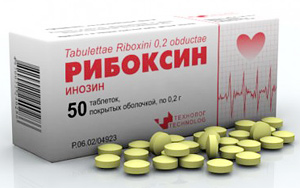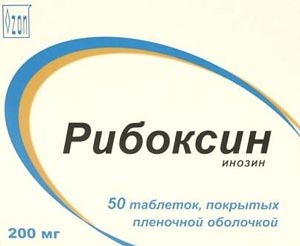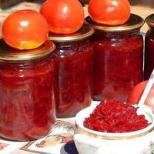Pharmacological action and correct dosage of Riboxin. Vitamins for the heart Riboxin: instructions for use
Pharmacodynamics
Inosine belongs to the group of drugs that regulate metabolic processes. The drug is a precursor for the synthesis of purine nucleotides: adenosine triphosphate and guanosine triphosphate.It has antihypoxic, metabolic and antiarrhythmic effects. Increases energy balance myocardium, improves coronary circulation, prevents the consequences of intraoperative renal ischemia. It is directly involved in glucose metabolism and promotes the activation of metabolism under conditions of hypoxia and in the absence of adenosine triphosphate.
Activates the metabolism of pyruvic acid to provide normal process tissue respiration, and also promotes the activation of xanthine dehydrogenase. Stimulates the synthesis of nucleotides, enhances the activity of some Krebs cycle enzymes. Penetrating into cells, it increases the energy level and has positive action on metabolic processes in the myocardium, increases the strength of heart contractions and promotes more complete relaxation myocardium in diastole, resulting in an increase in stroke volume.
Reduces platelet aggregation, activates tissue regeneration (especially myocardium and mucous membrane gastrointestinal tract.
Pharmacokinetics
Well absorbed in the gastrointestinal tract. Metabolized in the liver with the formation of glucuronic acid and its subsequent oxidation. A small amount is excreted by the kidneys.2. indications for use
Prescribed to adults complex therapy coronary disease heart, after myocardial infarction, cardiac arrhythmias caused by the use of cardiac glycosides.Prescribed for cirrhosis, fatty liver caused by alcohol or drugs and urocoproporphyria.
3. Method of application
Prescribed for adults orally, before meals.The daily dose when taken orally is 0.6-2.4 g. In the first days of treatment, the daily dose is 0.6-0.8 g (200 mg 3-4 times a day). If well tolerated, the dose is increased (on days 2-3) to 1.2 g (0.4 g 3 times a day), if necessary - to 2.4 g per day.
Course duration is from 4 weeks to 1.5-3 months.
For urocoproporphyria, the daily dose is 0.8 g (200 mg 4 times a day). The drug is taken daily for 1-3 months.
4. Side effects
Allergic reactions are possible in the form of urticaria, skin itching, skin hyperemia (discontinuation of the drug is required). Rarely during treatment with the drug does the concentration increase uric acid in the blood and exacerbation of gout (with long-term use).5. Contraindications
6. During pregnancy and lactation
The safety of using the drug Riboxin during pregnancy and lactation has not been established. Use of the drug Riboxin contraindicated during pregnancy.During treatment with Riboxin, you should stop breastfeeding.
7. Interaction with other drugs
Immunosuppressants (azathioprine, antilympholine, cyclosporine, thymodepressin, etc.) for simultaneous use reduce the effectiveness of Riboxin.8. Overdose
No cases of overdose have been reported to date9. Release form
Tablets, 200 mg - 20, 30 or 50 pcs.10. Storage conditions
In a dry place, protected from light, at a temperature not exceeding 25°C. Keep out of the reach of children.Best before date. 3 years. Do not use too late expiration date indicated on the packaging.
11. Composition
1 tablet:
inosine - 200 mgExcipients: potato starch 54.1 mg, methylcellulose 3.2 mg, sucrose 10 mg, stearic acid 2.7 mg.
12. Conditions for dispensing from pharmacies
The drug is dispensed according to the prescription of the attending physician.Found a mistake? Select it and press Ctrl + Enter
* Instructions for medical use for the drug Riboxin tablets is published in free translation. THERE ARE CONTRAINDICATIONS. BEFORE USE, YOU MUST CONSULT WITH A SPECIALIST
Ability to provide positive therapeutic effect, harmlessness to the body, positive reviews and low price allow Riboxin to maintain its popularity since the 70s. The drug is successfully used to treat heart diseases, maintain the health of pregnant women, lose weight and in bodybuilding to form beautiful muscles.
Compound
The tablets contain:
- riboxin;
- calcium stearate;
- starch;
- methylcellulose;
- sucrose.
The tablets are coated with a coating consisting of indigo carmine, iron oxide, lactose monohydrate, titanium dioxide, macrogol, quinyl yellow.
Injections contain inosine (20 mg/ml).
Inosine is the main active compound.
Release form
Riboxin is available in the form:
- Double-layer tablets. The biconvex tablets with a yellow or yellow-orange coating have a rough surface. Under the shell there is a white core. The tablets are sealed in blisters of 10 pieces. 1-5 blisters are placed in one pack.
- Solution for injection (two percent). The volume of each ampoule is 10 ml. 10 ampoules are placed in a cardboard box.
- Capsules. 20, 30 or 50 capsules are packaged in cardboard boxes.
pharmachologic effect
Riboxin is an effective anabolic steroid that can saturate the body with oxygen and eliminate arrhythmia (restore heart rhythm).
It supports the metabolism of glucose and pyruvic acid, stimulates protein synthesis, normalizes tissue respiration, and activates metabolism during oxygen starvation and ATP deficiency.
The medicine improves blood circulation. As a result, the tissues are saturated with oxygen, receiving good nutrition. They are getting better metabolic processes, energy supply is restored. A person feels a surge of vitality.

The drug eliminates tissue hypoxia, which is important during pregnancy, when cells experience constant shortage oxygen. At severe injuries, causing immobilization, Riboxin is administered intravenously. Nutrients are quickly transported with the blood stream to the cells of stationary areas of the body.
The medicine will not allow platelets to stick together and form conglomerates. Prevents blood clots from forming and improves blood clotting. At the same time, blood quality increases, heart rate normalizes and stabilizes, tissue regeneration occurs (increased restoration of the mucous membranes of the gastrointestinal tract and myocardium).
The drug acts as an immunostimulant and nonspecific antiviral agent. It inhibits development pathogenic microorganisms. Fights measles virus, herpes, lymphoma and other pathogens of infectious diseases. Under its influence, the body intensively produces lymphocytes that kill pathological microorganisms.
Riboxin has a beneficial effect on liver function. The cells of the organ, saturated with oxygen, are actively restored. It is used in complex therapy for heart diseases.
The drug is recommended for athletes and bodybuilders. He nourishes muscle tissue, promotes effective expansion muscles.
Indications for use
The medicine is taken in complex therapy and as an independent remedy. It is used for treatment serious pathologies heart, digestive organs, liver. It is recommended in bodybuilding. The drug should not be taken without a doctor's prescription.
Riboxin is prescribed when the following pathologies are detected:
- Liver cirrhosis, hepatitis with damage and degeneration of tissue structures.
- Ischemia. Riboxin is taken at any stage of the disease and myocardial infarction.
- Myocarditis and cardiomyopathies.
- Arrhythmia (failures heart rate). Riboxin is especially effective for arrhythmia that occurs due to drug and alcohol intoxication.
- Myocardial dystrophy of various etiologies.
- Peptic ulcer disease.
- Uroporphyia (metabolic imbalance).
- Fatty degeneration and toxic damage to liver tissue.
- Eye diseases (for example, open-angle glaucoma).
- Cancer. The drug is prescribed after radiation, chemotherapy and surgical operations. He's filming side effects caused by radical methods treatment malignant tumors. Reduces the concentration of leukocytes after radiation therapy. Supports the body, alleviates the condition of cancer patients.
- Transferring inadequate physical activity in bodybuilding, which negatively affect the body. Riboxin relieves physical stress, replenishes energy, and gives strength to the bodybuilder.
Contraindications

Riboxin is contraindicated in people with hypersensitivity to its components. An allergic reaction is expressed by redness of the skin and itching. Allergy symptoms disappear as soon as the patient stops taking the medication.
It is not prescribed to those who suffer from gout or who have an imbalance of uric acid and purines. Long-term use of the drug in people with kidney disease leads to the development of gout. If gout occurs, stop taking the medication. The patient is prescribed medications to relieve inflammation in the joints.
Treatment of patients undergoing chemotherapy is carried out under the strictest medical supervision. Doctors monitor blood tests and determine the concentration of uric acid in it. This allows you to avoid the occurrence of side effects (attack of gout) from the use of potent drugs, the effect of which is enhanced by Riboxin.
Research by scientists indicates that Riboxin is not suitable for long-term therapy. However, medical practitioners claim that long-term treatment the drug allows you to achieve optimal results.
Side effects do not occur if the patient takes Riboxin, adhering to the instructions and recommendations of the doctor (does not exceed the permissible dosage).
In case of an overdose, the skin begins to itch, a rash and redness appear on it. The patient has a feeling of heaviness in the chest, the heart beats intensely. Such signs do not pose a serious danger to life. As soon as the concentration of inosine in the blood drops, the symptoms disappear.
Riboxin - not harmless medicine, self-medication is unacceptable for them. Prescribing the drug, the form of its administration (tablets, injections, capsules), dosage is the prerogative of a qualified doctor.
Side effects
Riboxin can provoke:
- in case of overdose, intoxication of the body and tachycardia, which quickly disappears after discontinuation of the drug;
- allergies (skin itching, urticaria);
- uric acid imbalance, gout attack;
- arterial hypertension;
- general weakness.
Instructions for use
The tablets are taken before meals. At the beginning of therapy, take 1 tablet 3-4 times a day. This scheme is used for 1-2 days. If there are no side effects, the dosage is increased to 2.4 g per day (corresponds to 4 tablets). The course of treatment is determined by the doctor. It can last 1-4 months (depending on individual characteristics body of a particular patient).
Patients with urocoproporphyria are prescribed no more than 0.8 g (200 mg per dose) of the drug per day for 1-3 months. The disease is characterized by an increase in the concentration of uric acid and its salts. Inosine increases the rate of urate metabolism, which leads to the formation and deposition of stones. Therefore, the prescribed dosage (1 tablet 4 times a day) is not exceeded.
Solution for injection is intended for intravenous administration. It is injected in a stream or dripped. A stream of liquid is slowly injected into the vein. On the first day, use only one ampoule (10 ml). If the patient does not have adverse reactions, the dose is doubled (the solution is administered twice a day, 10 ml; or once a day the entire volume (20 ml) at once).
For drip administration, the medicine is mixed with a glucose solution (5%) or sodium chloride (0.9%). The volume of liquid should be 250 ml. The solution is supplied at 40-60 drops/min. Duration of treatment is 10-15 days.
Overdose
To avoid an overdose, Reboxin should be taken according to the regimen drawn up by doctors, or follow the recommendations given in the instructions. Increased doses lead to skin itching, reddening of the epithelium, and the appearance of rashes. They can provoke an irregular heartbeat and heaviness in the chest.
An overdose is not too dangerous for health. If symptoms of intoxication appear, stop taking the drug and consult a doctor.
Interaction
There are both drugs with which Riboxin is perfectly combined, and medications that are incompatible with it:
- The simultaneous use of cardiac glycosides and Riboxin eliminates arrhythmia and increases the force of contraction of the heart muscle.
- The drug increases the effectiveness of Heparin and increases the time of its effect on pathological foci.
- Riboxin is compatible with furosemide, nitroglycerin, spironolactone, nifedipine.
- The injection solution must not be mixed with alkaloids. As a result of their interaction, insoluble compounds are formed.
- Contraindicated simultaneous administration vitamin B6 and Riboxin. When combining drugs, they are completely deactivated.
- The injection solution is diluted only in recommended solvents (glucose, sodium chloride). IN otherwise unwanted events occur in the solution chemical reactions between substances.
Riboxin in bodybuilding

For achievement high results In bodybuilding, athletes often take legal drugs. Building muscle mass and pumping up muscles cannot be achieved without performing grueling physical exercises.
To facilitate the formation beautiful body bodybuilders drink harmless supplements. Thanks to dietary supplements, athletes are able to withstand a crazy pace and get less tired.
Riboxin helps to form beautiful muscles without harm to the body. Taking it, bodybuilders quickly recover from the hardest strength training. They experience a surge of vital energy.
Riboxin, once in the athlete’s body, enhances metabolism, activates biochemical and energy processes, promotes cell and tissue regeneration, and increases endurance.
The drug has a vascular strengthening effect. Thanks to it, sprains and injuries are less likely to occur. Under conditions of excessive force loads, the heart muscle has time to relax between contractions.
Riboxin is the most effective anabolic in bodybuilding among other non-steroidal and non-hormonal medications. It is an excellent alternative to creatine, which is an unsafe and expensive supplement.
How to take Riboxin
Tablets are taken 30-60 minutes before meals. Start taking the drug with one tablet. If no adverse reactions occur within 1-2 days, the dosage is adjusted to 2.5 g per day.
The calculation for taking tablets is made as follows: per 10 kg of weight of an athlete or bodybuilder, use 0.15 g of the drug. Take the tablets 1.5-2 hours before starting strength training. Riboxin is taken in courses. Their duration is 1-4 months. The rest between courses should be at least 2-3 months.
Potassium orotate and Riboxin in bodybuilding
Bodybuilders often take Riboxin in tandem with Potassium Orotate, a safe drug. When used together, medications achieve complete absorption and provide lasting results.
A single dose for bodybuilders is 2 tablets. This is quite enough to achieve optimal sporting achievements. Strength training after joint use of drugs is effective.
Athletes feel a lift in their spirits. Their performance is activated and their endurance increases. Complex therapy gives more tangible results: simultaneous intake of Riboxin and Potassium Oratate with vitamins, adaptogens, and metabolites.
Asparkam and Riboxin in bodybuilding
Asparkam – complex medicine, popular among those who actively lose weight and play sports. It contains magnesium and potassium aspartate. Magnesium aspartate maintains protein balance and transports energy in the required volume. Potassium aspartate normalizes metabolism at the cellular level.
During strength training, Asparkam is very useful supplement, relieving fatigue. An unexhausted bodybuilder trains more effectively and can easily endure heavy loads.
When an athlete is in shape, he is able to achieve optimal performance. The feeling of strength allows you to increase muscle mass, create beautiful reliefs on the body.
To avoid fluid accumulation in tissues, Asparkam is taken together with diuretics. At the same time, waste products leave the body, and useful material are held.
Taking Asparkam starts with 1-2 tablets 3 times a day. An increase in the dosage of the drug is carried out based on the results of tests and general condition bodybuilding athlete. For each bodybuilder, the course and regimen for taking Asparkam is strictly individual (prepared by their sports doctor).
Analogs
Preparations similar to Riboxin contain substances identical to inosine. They may contain Inosie-F, Riboxin bufus, Ribonosine.
Analogues of the drug include:
- Piracetam;
- Enap;
- Panangin.
Panangin is close in effect to Riboxin. It nourishes the heart and improves its functioning. Normalizes activity of cardio-vascular system.
The cost of Riboxin is low. The price of its analogues is even lower. The cost of the drugs does not exceed 100 rubles.
Riboxin is medical drug, which has a positive effect on metabolic reactions in human body. If we talk in simple words, then Riboxin helps improve metabolism in the cells of organs and tissues. The manufacturer of this medication also claims that the use of the medication helps eliminate oxygen starvation, as well as normalization of heart rate. The effectiveness of the drug is so high that it is even used to increase endurance and physical strength.
Forms of release of the drug
Riboxin is available in the form of an injection solution, and the main component of the medication is inosine. This substance, which has the form of a white powder with a yellow tint and odorless, is contained in one milliliter in the amount of 20 mg. Riboxin in the form of injections is available in ampoules of 10 ml.
Riboxin injections are intended for injection into a vein. Most sources claim that the drug must be used exclusively in a vein. Instructions for the use of Riboxin injections state that the solution is intended for intravenous administration by stream or by drip. About the ban on intramuscular use nothing is said, so its introduction into the muscle is ineffective and irrational. The drug is produced by various pharmaceutical companies in countries such as Russia, Belarus and Ukraine.
It is important to know! In addition to the injection form, Riboxin is also available in tablet form. In what form to use the medication is decided solely by a specialist. The difference between these forms of release lies in the speed of delivery of the main component of the drug, inosine, to the internal organs.
In addition to the main component inosine, Riboxin injections include:
- caustic soda;
- hexamine;
- sterile liquid.
The drug packages contain 5 or 10 ampoules of the drug, the volume of which is 5 or 10 ml.
Features of the drug Riboxin
Riboxin is an anabolic, that is, it has an antiarrhythmic and antihypoxic effect. The main component inosine takes an active part in glucose metabolism, as well as stimulating metabolic processes.
Through the components of the solution, normalization occurs cellular respiration even with ATP deficiency. After using the medication, the substances of the drug act on enzymes involved in metabolic processes.
Due to the positive effects of inosine, the process of platelet joining is inhibited, as a result of which the likelihood of blood clots forming in the lumens of blood vessels is significantly reduced. The use of Riboxin intravenously allows for the prevention of thrombosis and thromboembolism. In addition, under the influence of the components of the drug, the processes of degeneration of myocardial tissue and the digestive system are launched.
It is important to know! Immediately after the drug is administered intravenously, it is transported to tissues that need ATP. Excessive amounts of the drug are excreted natural ways through urine, feces and bile.
Advantages and disadvantages of Riboxin
Riboxin has many benefits due to its positive impact on the body for various ailments and diseases. Benefits include:
- Increasing energy balance muscle cells hearts.
- Prompt formation of nucleoside phosphates.
- Acceleration of cardiac muscle tissue renewal.
Through this medication The contractile activity of the heart muscle is normalized. Despite positive influence drug on the human body, Riboxin also has disadvantages. Disadvantages include:
- Such a property of the medicine as a change in the natural sequence of the metabolic cycle has a negative effect on a person. This means that inosine affects metabolic processes, carrying out their arbitrary correction.
- Arbitrary adjustment of metabolic processes can negatively affect human physiology, so the development of serious complications cannot be ruled out.
- The drug cannot be used for preventive purposes for a person who does not have pathological abnormalities.
The drug Riboxin was created to help people avoid fatal outcome during development pathological processes. For correct application Riboxin, the need for its administration intravenously or intramuscularly must be decided medical specialist after examining the patient.
Indications for use
Indications for the use of the drug Riboxin are as follows:
- Coronary heart disease. The medication is used regardless of the stage of the disease. It is also prescribed after a heart attack has occurred.
- Myocardial damage. If the causes of myocardial development have not been identified, then the drug is prescribed for use over a long period.
- With congenital porphyria. This is a disease that is a disorder of pigment metabolism.
- Arrhythmia. Allows you to quickly normalize your heart rhythm.
- To normalize vision in the diagnosis of open-angle glaucoma.
- Diseases: cirrhosis, steatosis and hepatitis. Used as part of complex therapy.
- During pregnancy. The need to use the medication is prescribed by a doctor.

With more detailed list Indications for the use of the medication in question can be found in the instructions attached to it. When purchasing a medication, there is no need to present a prescription from a doctor.
Contraindications for injections
In addition to the fact that Riboxin is prohibited from being used unless indicated, there are also contraindications to its use in the presence of one of the above diseases. Contraindications include:
- Individual intolerance to the substances included in the medication. This is why it is important to familiarize yourself with the composition of the product before using it.
- With an excessive amount of urea in the blood and urine.
- For problems with the kidneys and liver, if there are disruptions in their functioning.
- The drug should not be administered to children under 3 years of age.
- During pregnancy and breastfeeding. Used for individual indications and only as prescribed by a doctor.
- If you have diseases of the joints and tissues, for example, gout.
In addition, experts do not recommend administering the drug to people who are sick. diabetes mellitus. If there are contraindications, the doctor decides whether it is necessary or possible to use the medication. In most cases, a medication is used only in cases where the benefit will outweigh the potential risk. Before administering the medication to mandatory the patient needs to donate blood.
Features of the use of Riboxin
Injecting Riboxin in a single dose is allowed only in the event of the development of acute cardiac arrhythmias. This dosage ranges from 200 to 400 mg or 10-20 ml of solution. The medication is used in a jet method to provide pharmacological protection to the kidneys.
Parenteral administration of the drug is carried out slowly and dropwise at a rate of 40 to 60 drops per minute. Therapy with intravenous administration of Riboxin begins with 200 mg 1 time per day. If the medication is well tolerated by the patient, the dosage increases to 400 mg 1-2 times a day. The course of such treatment usually lasts from 10 to 15 days.

It is important to know! Before administering the drug intravenously, it is diluted in a 5% dextrose (glucose) solution. Instead of glucose, you can use saline solution in an amount of no more than 250 ml.
The instructions for use do not say anything about the fact that Riboxin can be injected intramuscularly. Nothing is said about the prohibition of such use, therefore, if necessary, this method can be carried out, but only as prescribed by a doctor and according to the relevant indications. It is also worth noting that when intramuscular injection development of the medication will be observed pain syndrome. Typically, the indication for using the drug intramuscularly is to increase endurance and build muscle mass.
Development of adverse symptoms
Indications for the use of Riboxin do not mean that after the injection no side symptoms will be observed. In most cases, side symptoms after injection occur in the form of the following:
- Development allergic reactions.
- The appearance of a rash on the skin.
- Increased blood flow, manifested as marked redness of the skin.
- Hives.
- Pain at the injection site and rapid heartbeat.
- Headaches and dizziness.
- Vomiting and nausea.
- Excessive sweating.
- Excess acid in urine.
- Weakening of the body.
- Skin irritation and burning.
If side symptoms occur, you need to warn your doctor about it. The doctor will determine the cause side symptoms, after which he will decide on the need for further therapy.
Effect on the body during pregnancy
Studies on the effect of Riboxin on pregnant and lactating women have not been conducted. To exclude the development of side symptoms and complications, it is not recommended to use the medicine during these periods. The exception is cases when the positive effect of the product will help save a woman’s life. The decision about the need to administer Riboxin to a woman is strictly decided by the attending physician. During breastfeeding the child should be transferred to artificial feeding, and then administer the medication.
It is important to know! Riboxin is prohibited for use in children under 3 years of age, as its effect on the action child's body has not been studied.
Interaction with other means
Riboxin is allowed to be used in combination with other medical supplies. Some joint use drugs improves the therapeutic effect. These drugs include:
- Heparin. When used together, the effect of Heparin is enhanced and the duration of exposure is increased.
- Cardiac glycoside. Concomitant use promotes positive inotropic effects.
- Beta blockers. Combined use does not have any negative effect of medications on each other.
IN exceptional cases It is allowed to use Riboxin together with nitroglycerin, furosemide and spironoloctone. Co-administration of Riboxin with alkaloids, acids and salts of heavy metals is contraindicated.
It is also important to note the fact that the combined use of Riboxin with alcohol can cause the development of side symptoms, and also lead to diverse species complications and pathological abnormalities. The word "alcohol" refers to all types alcoholic drinks, starting from low alcohol.
Overdose
In case of overdose, side symptoms will not take long to appear. The injection must be strictly supervised by a specialist, so the slightest overdose can cause itching, allergies, and redness skin, as well as heart heaviness.
The drug is removed naturally, so in most cases you just need to wait. The exception is allergic reactions, in the event of which it is necessary to immediately resort to the use of antiallergic drugs.
It is important to know! Medical research not a single case of Riboxin overdose was identified.
Cost and storage features
On average, the cost of the medication Riboxin in the form of injections is 100-150 rubles per package. The package contains 10 ampoules of a 2% solution. There are packages of 5 ampoules of the drug. The cost of such packaging ranges from 50 to 80 rubles, which depends on the manufacturer of the drug.
Riboxin does not contain live bacterial strains, so it can be stored outside the refrigerator, but it is important that the storage temperature does not exceed 25 degrees. Such storage allows you to extend the life of the medication.
The shelf life of Riboxin from the date of production is 4 years, but if sediment is found at the bottom of the ampoules, it should be disposed of. After the expiration date, the medication must not be used.

Riboxin for animals
The nonspecific origin of Riboxin indicates that it can be used even in veterinary medicine. It is used to treat heart ailments in pets: cats and dogs. The main indications for the administration of Riboxin for animals are:
- Myocarditis.
- Insufficiency of the heart muscle.
- Myocardosis.
- Endocarditis.
- Heart defects.
Such ailments are often common in older pets. For animals, Riboxin is administered exclusively intramuscularly. The dosage is selected by the veterinarian. The course of treatment should not exceed 4 weeks. Completing a course of treatment for pets allows you to correct metabolism and also eliminate dystrophic disorders.
It is important to know! The veterinarian must inform you about the need to use the medication for pets.
Riboxin's analogues
If the pharmacy does not have the drug Riboxin, then the possibility of replacing it with analogues should be checked with your doctor. If the doctor allows you to replace the medication with analogues, then you need to pay attention to the following drugs:
- Adexor;
- Vazonat;
- Cardazin;
- Metamox;
- Methonate;
- Mildronate;
- Nuclex;
- Mildralex.
Riboxin– metabolic agent, refers to the precursors of ATP. It has anabolic, antiarrhythmic, antihypoxic and coronary dilation effects. Participates in glucose metabolism, activates metabolic processes under hypoxic conditions, stimulates the activity of Krebs cycle enzymes and nucleotide synthesis. Activates metabolic processes in the myocardium, having a positive effect on metabolic processes in the heart muscle, increases the strength of heart contractions, and ensures adequate relaxation of the heart muscle in diastole. Reduces platelet aggregation and stimulates the regeneration of ischemic tissue. Improves blood circulation in the coronary vessels.
Riboxin absorbed in the digestive tract, metabolized in the liver, and excreted by the kidneys in small quantities.
Indications for use
Riboxin used in complex therapy:- IHD ( coronary insufficiency, myocardial infarction, heart rhythm disturbances);
- myocardial dystrophy;
- myocarditis;
- heart defects, congenital and acquired;
- arrhythmias caused by taking cardiac glycosides;
- coronary atherosclerosis;
- “pulmonary” heart; dystrophic changes heart muscle due to endocrine pathology or heavy physical activity;
- liver cirrhosis; acute and chronic hepatitis;
drug-induced and toxic liver damage;
urocoproporphyria;
- open-angle glaucoma with normalized intraocular pressure.
Riboxin is used as a pharmacoprotective drug during operations on an isolated kidney.
Mode of application
Inside Riboxin prescribed in daily dose 0.6-2.4 g. In the first two days - 1 tablet (capsule) 3-4 times a day. From the third day the dosage (in the absence allergic complications) increase to 1.2-2.4 g per day. The duration of treatment is from 4 weeks to 3 months. The drug is taken before meals.Riboxin in complex therapy of urocoproporphyria, 0.8 g per day is prescribed in 4 doses, every day, for 1-3 months.
Riboxin solution for parenteral administration:
For intravenous administration, a 2% solution of Riboxin is diluted in 250 ml of sodium chloride 0.9% solution or glucose solution 5%.
Intravenous administration of Riboxin (drip or stream, slowly - 40-60 drops per minute) starts with 0.2 g once on the first day, the dosage is increased to 0.4 g 1-2 times a day (in the absence of allergic manifestations). The course of treatment is 10-15 days.
For pharmacoprotection of the kidneys from ischemia, Riboxin is administered intravenously in a stream 10-15 minutes before clamping the renal artery in a single dosage of 1.2 g (60 ml of a 2% solution); after restoration of blood circulation, 0.8 g (40 ml of a 2% Riboxin solution).
At acute disorders heart rate, jet injection is allowed Riboxin at a dose of 200-400 mg.
Side effects
Riboxin usually well tolerated. IN in some cases Allergic reactions may occur: skin itching, urticaria, skin hyperemia. IN in rare cases it is possible to increase the level of uric acid in the blood.Contraindications
Gout, increased sensitivity to the drug, hyperuricemia.Interaction with other drugs
Riboxin when used as part of complex therapy, it potentiates the effect of antianginal, antiarrhythmic and inotropic drugs.Overdose
Cases of drug overdose with clinical application not registered.Release form
Riboxin tablets, coated:1 tablet contains 0.2 g of inosine;
in packs of 10, 20, 30, 40, 50 pcs.
Riboxin capsules:
1 capsule contains 0.2 g of inosine;
in packs of 20, 30, 50 pcs.
Riboxin solution for injection 2%:
10 ml of solution contains 200 mg of inosine;
There are 10 ampoules in a package, in ampoules of 5 or 10 ml.
Storage conditions
List B drug. Store in a dry place at a temperature of 15-25 degrees Celsius. Keep away from direct sunlight.Compound
Pills: active substance- inosine -200 mg.Ampoules: active substance – inosine - 20 mg/ml.
Additionally
At long-term use high doses may worsen gout.Riboxin Prescribe with caution to patients with renal failure.
Riboxin is not used as a means of emergency correction of cardiac disorders.
Main settings
| Name: | RIBOXIN |
| ATX code: | C01EB14 - |
Riboxin is a drug that improves metabolic processes in the body after heart disease and is prescribed to the patient as part of a comprehensive treatment.
Instructions for use Riboxin
What is the composition and release form of Riboxin?
The medicine is produced in a solution, it can be colorless or slightly colored, the medicine is transparent, where active ingredient is inosine (riboxin) at a dosage of 20 milligrams. The medication is intended for parenteral use, in particular intravenous.
The drug is placed in ampoules made of darkened glass, on which a notch is applied. Containers of 5 and 10 milliliters are placed in cell packaging made of so-called polyvinyl chloride film. The medicine is accompanied by a special ampoule scarifier, which is used to open the medicine. The shelf life is three years; after this time, the pharmaceutical product must be disposed of. Riboxin is sold by prescription.
What is the effect of Riboxin?
The drug Riboxin is a derivative of purine, the so-called precursor of adenosine tiphosphate, which stimulates metabolic processes in the body. In addition, the medicine has an antihypoxic effect and also has an antiarrhythmic effect. Increases the energy balance of the myocardium, and also normalizes coronary circulation, in addition, prevents Negative consequences renal ischemia.
The pharmaceutical product is involved in glucose metabolism and, under hypoxic conditions, activates some metabolic processes. It triggers the metabolic processes of pyruvic acid, which is involved in tissue respiration, and helps to increase the production of the so-called xanthine dehydrogenase.
Medicine stimulates the biosynthesis of nucleotides, in addition, affects the activity of enzymes involved in the complex biochemical Krebs cycle. Entering the cells, Riboxin has a positive effect on the metabolic processes occurring in the heart muscle, as a result the strength of myocardial contractions increases, and the so-called stroke volume increases slightly.
In addition to the above, Riboxin reduces platelet aggregation and promotes activation regenerative processes in tissues, especially in the myocardium, in addition, in the mucous membrane lining digestive tract. The active compound is metabolized in the liver, where glucuronic acid is formed. Excreted in urine.
What are Riboxin's indications for use?
Riboxin's indications include complex treatment IHD (post-infarction, cardiac arrhythmia), with myocardial dystrophy after a history of infectious pathology.
In addition, the medicine is prescribed for liver diseases ( fatty degeneration, cirrhosis, hepatitis). Surgery on the kidney (as pharmaceutical protection during the so-called shutdown of blood circulation).
What are Riboxin's contraindications for use?
I will list the situations in which Riboxin’s instructions for use do not allow use:
If hypersensitivity to the components of the medication is detected;
Do not use the medicine if you have diagnosed gout;
During lactation;
In laboratory determination of hyperuricemia;
During pregnancy;
Up to 18 years old.
Besides, in relative contraindications Riboxin includes the treatment of patients with renal pathology, in particular with insufficiency.
What are the uses and dosage of Riboxin?
The drug Riboxin is used intravenously as a bolus, the medication is administered slowly or by drip. Therapeutic measures start with the introduction of 10 ml of a 2% solution once a day, and if well tolerated, the dosage of Riboxin can increase to 20 milliliters. On average, the use of Riboxin is up to 15 days.
Injection of the drug is carried out in case of acute cardiac arrhythmias in a single dosage of 200-400 mg of the pharmaceutical drug. For the so-called pharmaceutical protection of ischemic kidneys, the drug is injected into the patient in an amount of 60 milliliters approximately 5 or 15 minutes before clamping the renal artery. Next, an additional 40 milliliters of the pharmaceutical drug is infused after normal blood circulation is restored.
When administered by drip, the drug Riboxin is recommended to be diluted in 5% dextrose or isotonic sodium chloride. Before you start therapeutic measures, it is recommended to consult a doctor.
What are the side effects of Riboxin??
When the solution is administered, the side effects of Riboxin include the appearance of allergic reactions to the medication, which manifest themselves skin itching, as well as redness of the skin. Sometimes an increase in uric acid in the blood can be detected in the laboratory; in addition, exacerbation of gout is possible, especially with long-term use of this metabolic medicine.
Riboxin - overdose
Currently, there have been no reported cases of Riboxin overdose.
Special conditions
If the color of the medicine changes, as well as if the integrity of the ampoule is damaged, you should refrain from subsequent administration of the medicine.
How to replace Riboxin, what analogues should I use?
Riboxin analogues include: Riboxin-Vial, Riboxin-UVI, Riboxin-Darnitsa, Vero-Riboxin, Riboxin-LekT, as well as Analogs, Ribonosin, in addition, Riboxin bufus, Riboxin-Ferein, Inosin-Eskom, Inosie-F, and also Inosine.
Conclusion





